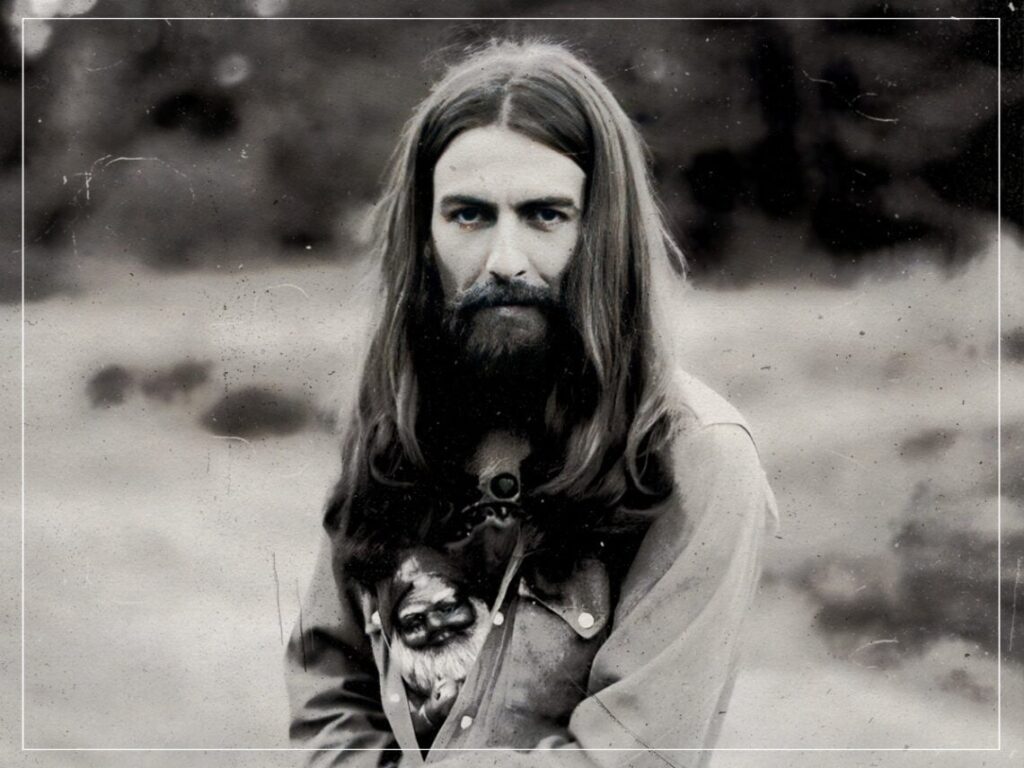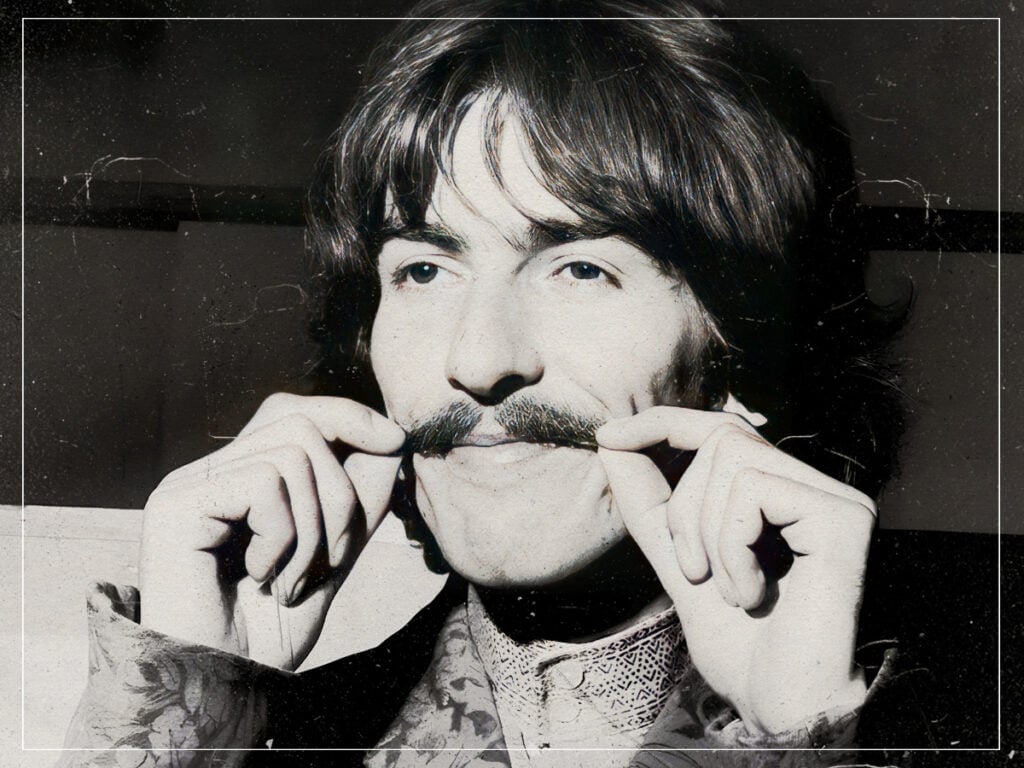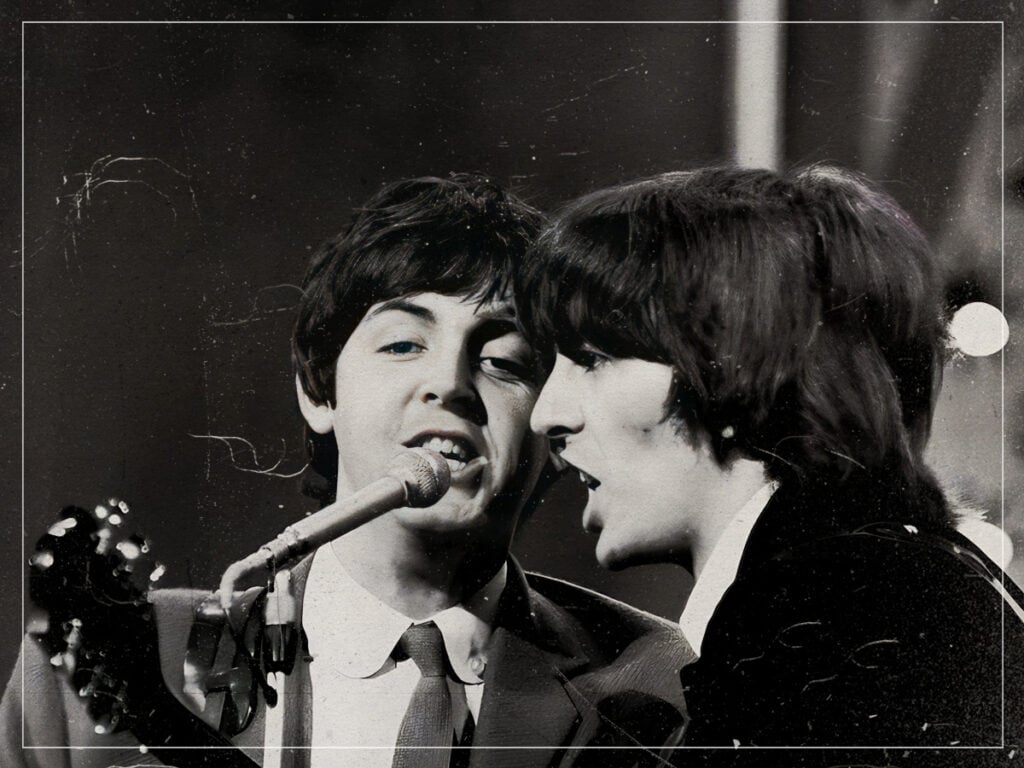The one George Harrison song about The Beatles’ sour breakup: “I can’t carry the blame for you:
 Posted On
Posted On
(Credits: Far Out / Tidal)
It’s safe to say that The Beatles’ split was far less amicable than their fans might have hoped. After nearly a decade at the pinnacle of global culture, with no real rivals in sight, the immense pressure had strained the relationships within the Fab Four, causing tensions to rise. What began as a brotherly bond, united by a shared goal of conquering the pop music world, gradually unravelled as individual ambitions surfaced and each member sought to forge their own path.
For the most part, ‘creative differences’ is a gentle enough term to label the breakup. But, the truth is, the once close-knit group had not only drifted apart but had started to try and sink one another’s boats. John Lennon and Paul McCartney had become so creatively different that it is a wonder they still put each other’s names to their songs. Ringo Starr’s affable nature had begun to wane as his position as the butt of the Beatles joke was wearing thin. However, it was George Harrison who was the most bitter as the group split.
Constantly overshadowed by his bandmates was a situation Harrison could no longer endure. While every Beatle quit the group at some point or another, Harrison seemed the most desperate to break free from its confines. Stifled by the towering presence of Lennon and McCartney, he was the one most eager to escape. Once he finally cut ties, Harrison wasted no time firing musical broadsides, unleashing his creativity in full force.
Of course, Harrison wasn’t the only one to react bitterly to the breakup. Following the split, the band members didn’t hold back in expressing their disdain for one another. Not only did they trade insults in interviews—inevitable, given that all anyone wanted to discuss was the Fab Four—but they also used their music as a platform for pointed barbs. McCartney famously criticised Lennon’s sanctimonious virtue-signalling on ‘Too Many People’ from his solo album Ram. In response, Lennon fired back with the scathing ‘How Do You Sleep?’, a track loaded with venom aimed squarely at McCartney. Adding to the sting, Lennon enlisted Harrison to deliver an extra six-string jab.
Harrison also expressed his feelings towards the other members of the Fab Four, though, in typical Harrison fashion, his approach was far more subtle. The ‘My Sweet Lord’ singer conveyed his sentiments with nuance on his triple solo album All Things Must Pass. The record included several understated references to his time with The Beatles, hinting at his frustration with being perpetually relegated to the bottom rung.

In fact, there’s an argument that the triple LP, so full of songs Harrison had written for the band before they were neatly rejected, could operate as a complete punch to the collective nose of the group. But ‘Run of the Mill’ is undoubtedly the track in which Harrison goes into the most depth about his troubles with John Lennon, Paul McCartney and Ringo Starr.
The song was initially written during the strange period when the band were shooting the Let It Be documentary in January 1969. It was around the time that Harrison had decided he’d “had enough” and quit The Beatles for a short period of time as all the bad blood had got too much for him. During this time, he realised that being in a band would no longer suit his purpose and, if he wanted to get his spiritual message out there, he would need his own platform. All Things Must Pass is the magnificent solo LP that would be at that moment.
‘Run of the Mill’ closed out the second side of the record and is a vintage piece of work which stands up with anything that The Beatles, together or individually, have ever produced. Harrison starts singing about choice and “when to and not to raise their voices” in the opening lyrics. In the chorus section, he ponders how “no one around you can carry the blame for you”.
In the later verses, Harrison sings directly about perhaps his most fearsome adversary in the band: McCartney. Considering he remained close friends with Lennon and Starr following the initial split, he asks himself, “How I lost your friendship?”. The guitarist then answers his own question and swoons: “I see it in your eyes, though I’m beside you, I can’t carry the blame for you”.
Infamously, the business side of The Beatles had started to take its toll on Harrison at the time, who was struggling to see the value in their Apple Corps side project: “Me, I was never really interested in Apple shops or anything else,” Harrison told Melody Maker in 1975. “During the whole Apple period, I was always mainly interested in working in the studio, recording…I couldn’t be bothered to follow through [with business ideas]. I suppose my attitude didn’t help.”

All of that ill feeling bleeds into the track, and Harrison also told Derek Taylor in 1979 about the song’s composition: “It was when Apple was getting crazy…Paul was falling out with us all and going around Apple offices saying ‘You’re no good’—everyone was just incompetent” (the Spanish Inquisition sketch). It was that period—the problem of partnerships.”
Harrison was also clearly upset at his treatment within the band; the repeated discussions of not being seen as an equal to Lennon and McCartney had pushed him close to the edge, and it was a situation most people from the outside saw clearly: “George got stuck with being the Beatle that had to fight to get songs on records because of Lennon and McCartney. Well, who wouldn’t get stuck?” A question once posed by Bob Dylan, the singer-songwriter who also said of Harrison’s talent, “If George had had his own group and was writing his own songs back then, he’d have been probably just as big as anybody”—and who are we to argue with the great Bob Dylan?
A few months down the road and things would change. Weeks after he wrote ‘Run of the Mill’, Harrison was given more time on the upcoming album Abbey Road and delivered the beautiful ‘Here Comes The Sun’ and ‘Something’, material that proved to his bandmates that he was no junior to them. Even though Lennon and McCartney had still rejected plenty of wonderful songs that would make up his solo album, it was clear Harrison had made his point. Only a little while later, Harrison would have his huge-selling album and a permanent mark against his name.
Years later, the situation surrounding this whole ugly scenario rumbles on. In fact, in 2012, Mojo asked Olivia Harrison if there was one particular song of her late husband that always connected him with her with George, to which she replied, citing this particular All Things Must Pass track, explaining: “It’s a really beautiful song. Its lyrics are very inspiring — ‘It’s you that decides/Which way will you turn’ — and always a lovely reminder of him.”
Related Topics


